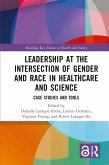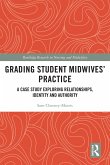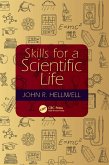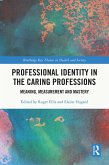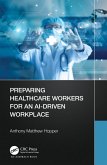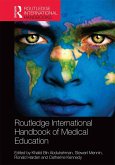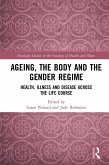Leadership at the Intersection of Gender and Race in Healthcare and Science (eBook, PDF)
Case Studies and Tools
Redaktion: Laraque-Arena, Danielle; Laraque-Ho, Rivers; Young, Virginia; Germain, Lauren
42,95 €
42,95 €
inkl. MwSt.
Sofort per Download lieferbar

21 °P sammeln
42,95 €
Als Download kaufen

42,95 €
inkl. MwSt.
Sofort per Download lieferbar

21 °P sammeln
Jetzt verschenken
Alle Infos zum eBook verschenken
42,95 €
inkl. MwSt.
Sofort per Download lieferbar
Alle Infos zum eBook verschenken

21 °P sammeln
Leadership at the Intersection of Gender and Race in Healthcare and Science (eBook, PDF)
Case Studies and Tools
Redaktion: Laraque-Arena, Danielle; Laraque-Ho, Rivers; Young, Virginia; Germain, Lauren
- Format: PDF
- Merkliste
- Auf die Merkliste
- Bewerten Bewerten
- Teilen
- Produkt teilen
- Produkterinnerung
- Produkterinnerung

Bitte loggen Sie sich zunächst in Ihr Kundenkonto ein oder registrieren Sie sich bei
bücher.de, um das eBook-Abo tolino select nutzen zu können.
Hier können Sie sich einloggen
Hier können Sie sich einloggen
Sie sind bereits eingeloggt. Klicken Sie auf 2. tolino select Abo, um fortzufahren.

Bitte loggen Sie sich zunächst in Ihr Kundenkonto ein oder registrieren Sie sich bei bücher.de, um das eBook-Abo tolino select nutzen zu können.
This book takes a case study approach to explore leadership narratives of women in healthcare and science, paying attention to the intersection of gender, identity, and race in each story
- Geräte: PC
- mit Kopierschutz
- eBook Hilfe
Andere Kunden interessierten sich auch für
![Leadership at the Intersection of Gender and Race in Healthcare and Science (eBook, ePUB) Leadership at the Intersection of Gender and Race in Healthcare and Science (eBook, ePUB)]() Leadership at the Intersection of Gender and Race in Healthcare and Science (eBook, ePUB)42,95 €
Leadership at the Intersection of Gender and Race in Healthcare and Science (eBook, ePUB)42,95 €![Grading Student Midwives' Practice (eBook, PDF) Grading Student Midwives' Practice (eBook, PDF)]() Sam Chenery-MorrisGrading Student Midwives' Practice (eBook, PDF)43,95 €
Sam Chenery-MorrisGrading Student Midwives' Practice (eBook, PDF)43,95 €![Skills for a Scientific Life (eBook, PDF) Skills for a Scientific Life (eBook, PDF)]() John R. HelliwellSkills for a Scientific Life (eBook, PDF)48,95 €
John R. HelliwellSkills for a Scientific Life (eBook, PDF)48,95 €![Professional Identity in the Caring Professions (eBook, PDF) Professional Identity in the Caring Professions (eBook, PDF)]() Professional Identity in the Caring Professions (eBook, PDF)40,95 €
Professional Identity in the Caring Professions (eBook, PDF)40,95 €![Preparing Healthcare Workers for an AI-Driven Workplace (eBook, PDF) Preparing Healthcare Workers for an AI-Driven Workplace (eBook, PDF)]() Anthony Matthew HopperPreparing Healthcare Workers for an AI-Driven Workplace (eBook, PDF)33,95 €
Anthony Matthew HopperPreparing Healthcare Workers for an AI-Driven Workplace (eBook, PDF)33,95 €![Routledge International Handbook of Medical Education (eBook, PDF) Routledge International Handbook of Medical Education (eBook, PDF)]() Routledge International Handbook of Medical Education (eBook, PDF)51,95 €
Routledge International Handbook of Medical Education (eBook, PDF)51,95 €![Ageing, the Body and the Gender Regime (eBook, PDF) Ageing, the Body and the Gender Regime (eBook, PDF)]() Ageing, the Body and the Gender Regime (eBook, PDF)45,95 €
Ageing, the Body and the Gender Regime (eBook, PDF)45,95 €-
-
-
This book takes a case study approach to explore leadership narratives of women in healthcare and science, paying attention to the intersection of gender, identity, and race in each story
Dieser Download kann aus rechtlichen Gründen nur mit Rechnungsadresse in A, B, BG, CY, CZ, D, DK, EW, E, FIN, F, GR, HR, H, IRL, I, LT, L, LR, M, NL, PL, P, R, S, SLO, SK ausgeliefert werden.
Produktdetails
- Produktdetails
- Verlag: Taylor & Francis eBooks
- Seitenzahl: 292
- Erscheinungstermin: 11. Mai 2022
- Englisch
- ISBN-13: 9781000623147
- Artikelnr.: 64210736
- Verlag: Taylor & Francis eBooks
- Seitenzahl: 292
- Erscheinungstermin: 11. Mai 2022
- Englisch
- ISBN-13: 9781000623147
- Artikelnr.: 64210736
- Herstellerkennzeichnung Die Herstellerinformationen sind derzeit nicht verfügbar.
Danielle Laraque-Arena is a Senior Scholar in Residence at the New York (NY) Academy of Medicine, Adjunct Professor of Epidemiology, Mailman School of Public Health, Columbia University, NY, Former Debra & Leon Black Professor of Pediatrics, Mount Sinai School of Medicine, Former Vice President Maimonides Children's Hospital of Brooklyn, NY and Chair Department of Pediatrics, Maimonides Medical Center, 7th President, SUNY Upstate Medical University now Emerita, Syracuse, NY, USA. Past President, Academic Pediatric Association. Lauren Germain is Director of Evaluation, Assessment and Research and Assistant Professor of Public Health and Preventive Medicine at SUNY Upstate Medical University. Co-Director of Harvard Macy Institute's course, A Systems Approach to Assessment in Health Professions Education. Virginia Young is a Research Services Librarian specializing in Health and Social Sciences at Le Moyne College, Syracuse, NY. Prior to that, Presidential and Health Sciences Librarian on the faculty at SUNY Upstate Medical University, Syracuse, NY. Graduate of the State University of New York at Albany with a master's degree in library science. Rivers Laraque-Ho is a Genre-bending, genderbending writer, editor, and perennial work-in-progress. Concerned with the relationship between art, power, and possibility in the revolutionary imagination. Graduated from Hampshire College with a degree in Creative Writing and Critical Race & Gender Studies.
Part I: Theories and Foundations of Leadership. 1.Prologue: Challenges and
Rewards of Leadership. 2.Theoretical Foundations to Consider. Part II:
Leadership Redefined. 3."Am I Not A Leader?". 4.Being the First Only
Different: Generational Perspectives in Driving Institutional Change in
Academia. 5.Interprofessional Leadership Amid Twin Pandemics.
6.Spirituality, Identity, and Leadership. Part III: Intersectionality in
Leadership. 7.Implicit and Overt Race/Gender Bias: Diversity of Leadership
in Health Care and Health Sciences. 8.Reproductive Justice: Policy and
Politics "When the Personal Is Political and the Political Is Personal".
9.Serving for Five Years: What I Learned About Reproductive Justice in
Mozambique, at the Center of the World. 10.Gender Identity and Leadership.
Part IV: Leadership Applied: Implications for Curricular Change in Medicine
and Science. 11.Women's Health Equity in Academia as recounted. 12.Leading
in the Military and Healthcare. 13.Genomics and Medicine. 14.National
Institutes of Health (NIH) and Funding Discretion. 15.Community Pediatrics.
Part V: Tools for Transformative Leadership and Organizational Learnings to
Increase Diversity, Inclusion and Equity. 16.Tool 1: Data to Drive Change
and Address Implicit Bias at the Organizational Level. 17.Tool 2:
Organizational Change: Helping from Inside. 18.Tool 3: Debunking Myths and
Leadership. 19.Tool 4: Beyond Title IX: Pursuing Full Participation through
Plan, Do, Study, Act (PDSA). 20.Tool 5- Dealing with Adversity and Emerging
Strong. Part VI: Epilogue. 21.Epilogue: Thoughts on the Journey and Keeping
the Conversation Alive Laraque-Arena.
Rewards of Leadership. 2.Theoretical Foundations to Consider. Part II:
Leadership Redefined. 3."Am I Not A Leader?". 4.Being the First Only
Different: Generational Perspectives in Driving Institutional Change in
Academia. 5.Interprofessional Leadership Amid Twin Pandemics.
6.Spirituality, Identity, and Leadership. Part III: Intersectionality in
Leadership. 7.Implicit and Overt Race/Gender Bias: Diversity of Leadership
in Health Care and Health Sciences. 8.Reproductive Justice: Policy and
Politics "When the Personal Is Political and the Political Is Personal".
9.Serving for Five Years: What I Learned About Reproductive Justice in
Mozambique, at the Center of the World. 10.Gender Identity and Leadership.
Part IV: Leadership Applied: Implications for Curricular Change in Medicine
and Science. 11.Women's Health Equity in Academia as recounted. 12.Leading
in the Military and Healthcare. 13.Genomics and Medicine. 14.National
Institutes of Health (NIH) and Funding Discretion. 15.Community Pediatrics.
Part V: Tools for Transformative Leadership and Organizational Learnings to
Increase Diversity, Inclusion and Equity. 16.Tool 1: Data to Drive Change
and Address Implicit Bias at the Organizational Level. 17.Tool 2:
Organizational Change: Helping from Inside. 18.Tool 3: Debunking Myths and
Leadership. 19.Tool 4: Beyond Title IX: Pursuing Full Participation through
Plan, Do, Study, Act (PDSA). 20.Tool 5- Dealing with Adversity and Emerging
Strong. Part VI: Epilogue. 21.Epilogue: Thoughts on the Journey and Keeping
the Conversation Alive Laraque-Arena.
Part I: Theories and Foundations of Leadership. 1.Prologue: Challenges and
Rewards of Leadership. 2.Theoretical Foundations to Consider. Part II:
Leadership Redefined. 3."Am I Not A Leader?". 4.Being the First Only
Different: Generational Perspectives in Driving Institutional Change in
Academia. 5.Interprofessional Leadership Amid Twin Pandemics.
6.Spirituality, Identity, and Leadership. Part III: Intersectionality in
Leadership. 7.Implicit and Overt Race/Gender Bias: Diversity of Leadership
in Health Care and Health Sciences. 8.Reproductive Justice: Policy and
Politics "When the Personal Is Political and the Political Is Personal".
9.Serving for Five Years: What I Learned About Reproductive Justice in
Mozambique, at the Center of the World. 10.Gender Identity and Leadership.
Part IV: Leadership Applied: Implications for Curricular Change in Medicine
and Science. 11.Women's Health Equity in Academia as recounted. 12.Leading
in the Military and Healthcare. 13.Genomics and Medicine. 14.National
Institutes of Health (NIH) and Funding Discretion. 15.Community Pediatrics.
Part V: Tools for Transformative Leadership and Organizational Learnings to
Increase Diversity, Inclusion and Equity. 16.Tool 1: Data to Drive Change
and Address Implicit Bias at the Organizational Level. 17.Tool 2:
Organizational Change: Helping from Inside. 18.Tool 3: Debunking Myths and
Leadership. 19.Tool 4: Beyond Title IX: Pursuing Full Participation through
Plan, Do, Study, Act (PDSA). 20.Tool 5- Dealing with Adversity and Emerging
Strong. Part VI: Epilogue. 21.Epilogue: Thoughts on the Journey and Keeping
the Conversation Alive Laraque-Arena.
Rewards of Leadership. 2.Theoretical Foundations to Consider. Part II:
Leadership Redefined. 3."Am I Not A Leader?". 4.Being the First Only
Different: Generational Perspectives in Driving Institutional Change in
Academia. 5.Interprofessional Leadership Amid Twin Pandemics.
6.Spirituality, Identity, and Leadership. Part III: Intersectionality in
Leadership. 7.Implicit and Overt Race/Gender Bias: Diversity of Leadership
in Health Care and Health Sciences. 8.Reproductive Justice: Policy and
Politics "When the Personal Is Political and the Political Is Personal".
9.Serving for Five Years: What I Learned About Reproductive Justice in
Mozambique, at the Center of the World. 10.Gender Identity and Leadership.
Part IV: Leadership Applied: Implications for Curricular Change in Medicine
and Science. 11.Women's Health Equity in Academia as recounted. 12.Leading
in the Military and Healthcare. 13.Genomics and Medicine. 14.National
Institutes of Health (NIH) and Funding Discretion. 15.Community Pediatrics.
Part V: Tools for Transformative Leadership and Organizational Learnings to
Increase Diversity, Inclusion and Equity. 16.Tool 1: Data to Drive Change
and Address Implicit Bias at the Organizational Level. 17.Tool 2:
Organizational Change: Helping from Inside. 18.Tool 3: Debunking Myths and
Leadership. 19.Tool 4: Beyond Title IX: Pursuing Full Participation through
Plan, Do, Study, Act (PDSA). 20.Tool 5- Dealing with Adversity and Emerging
Strong. Part VI: Epilogue. 21.Epilogue: Thoughts on the Journey and Keeping
the Conversation Alive Laraque-Arena.

